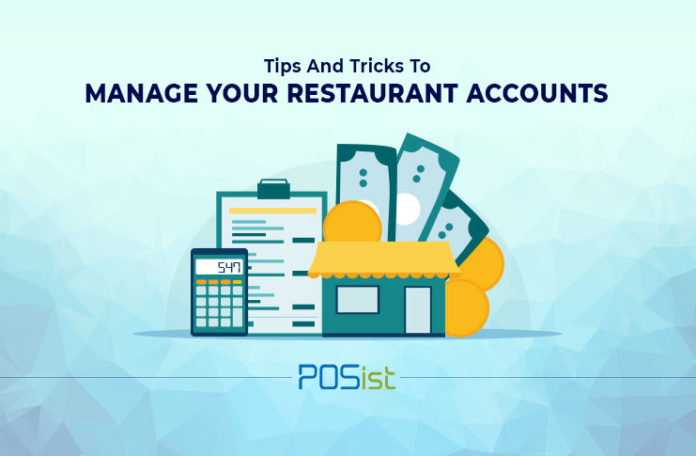Opening a restaurant is almost everyone’s dream but just being a good chef is not sufficient in the restaurant space today. To survive you need to know not only how to cook food but also how to sell food, maintain the sales and then count your sales. Yes, that is right, even if you are not an accountant to survive in the restaurant space today, you need to at least be prepared with the numbers game a little to make sure you know what is going on and what is not. To make it easier for you, here we have some restaurant accounting tips for you to look at so that next time the accountant comes, you know your end of information thoroughly.
Restaurant Accounting Tips to Swear By
Here is a restaurant accounting guide that you can follow to manage your restaurant finances better and know what your accountant is and is not doing.
1. Understand The Language
Asking people for advice is one thing, understanding it is another. In order to successfully master your restaurant accounting, the best course of action would be to learn the language of accounting. Words like debit, credit, balance sheet, cash flow which sound like gibberish right now are common vocabulary in the accounting sphere which you as an entrepreneur must be familiar with. We are not asking you to become accountants yourself but just understand the basic rules and terminology so you can understand what you are doing completely and what your bookkeeper or accountant has been doing all along. If you understand their language you will be able to work better with them and accounting for day to day finances will get easier for you.
2. Accuracy Matters
Don’t round off! While you may be tempted to round off a couple of rupees here and there, don’t do it. Even a single rupee every day makes a difference of 30 rupees in a month and though the figure may seem small, it will mess up your analytics, accounts, revenue or expense count and taxes. Take note of every rupee to know exactly what your profits or expenses are. This is especially important as overestimating your expenses can make you lose out on good business opportunities whereas underestimating them can lead you head on to a financial crisis.
3. Make Book-Keeping A Daily Practice
Account for your restaurant expenses and sales daily. Make it a habit, that way it is less taxing and you have a better idea of how the operations are being run. Soon you will start seeing patterns, like particular days which are slow, particular dishes that do not sell, etc. With these revelations, you can further optimize the way you strategize for your restaurant as you will be able to see in numbers what is working and what is not.
4. Know Your Expenses
Next, to successfully account for your restaurant finances, you need to know what your expenses are- Fixed and Running. Fixed expenses are those which stay the same. These include things like rent, depreciation on equipment, salary, etc. Running expenses better known as variable cost are those which are necessary to run the restaurant but keep changing, like electricity bill, cost of spilled food, water bill, etc. Having a knowledge of these expenses will make it easier for you to account for them and ultimately control them in the long run.
5. Create A P&L Statement
The next tip to easy restaurant accounting is to create a Profit and Loss Statement. A profit and loss statement is a document which mentions the break up of your costs and revenue for ease of understanding. Each and every expense and revenue like labor costs, bills, sales etc can be tracked through the creation of a P&L Statement which is also customizable. Though it is advised to create weekly Profit and Loss Statements, depending upon your restaurant type, accuracy, and need, you can create yearly or monthly Profit and Loss statements as well. It is essential for every restaurateur to have restaurant P&L knowledge. This will help him/her to get a better insight into the business.
6. Let Your POS Help You Out
Invest in a POS that can help you maintain an account. The purpose of regular accounting is not just to know your expenses and profits but to understand where the money is going and what is generating cash in order to perform better. A POS which gives you a detailed break-up of these figures in easy to comprehend charts or gives you a detailed analysis of your accounts, as Posist does is a must for you.
7. Bring In Automation
Automate your accounting software instead of manually importing data from your POS system, which can affect your financial accuracy. Through automation, you can easily track your inventory, manage recipe and payroll costs, improve sales and invoicing, and create detailed reports about the restaurant’s daily operations, thus saving on time, effort, and additional costs.
Many automation apps allow you to simply scan, upload, and process your invoices, which are automatically recorded and categorized into your system by amount, vendor and location. Fully automating your payment processes will give you the bandwidth to improve cash management processes as you can target making monthly batch payments.
A detailed daily operations summary report that can be generated from an automated accounting system will provide you with actionable insights on how to save on food and labor costs. These reports provide a thorough breakdown of your restaurant’s sales by location, time or service type. Furthermore, they can assist in scheduling staff as per peak hours requirements, thus saving on payroll spending. They also generate menu mix reports that can assist you in analyzing your costs, pricing and margin requirements, thus ensuring suitable menu engineering adjustments.
8. Ask Around
Asking your fellow restaurateurs how they maintain their books and keep a track of their finances will give you ideas about how you can better manage your own accounts. Asking for advice will only give you a clearer picture of what you may be missing or even worse doing wrong all along.
We understand restaurant accounting can be a hefty task, especially if you are not a fan of numbers and calculations but today a restaurant is no longer just a food service provider but a business and like every business, accounting in a restaurant is a must. We hope these tips help you out a little next accounting season!


















These accounting tips for the restaurant are great! It has made the work easier for me. Great work
Restaurant accounting is one of the most important aspects of making your business successful but is often avoided because it can be difficult tracking and making sense of all those numbers. Very comprehensive and informative, good points. Great Article.
Great tips on restaurant accounting and finance management. Even if you have a professional accountant on board, you should be updated about your numbers.